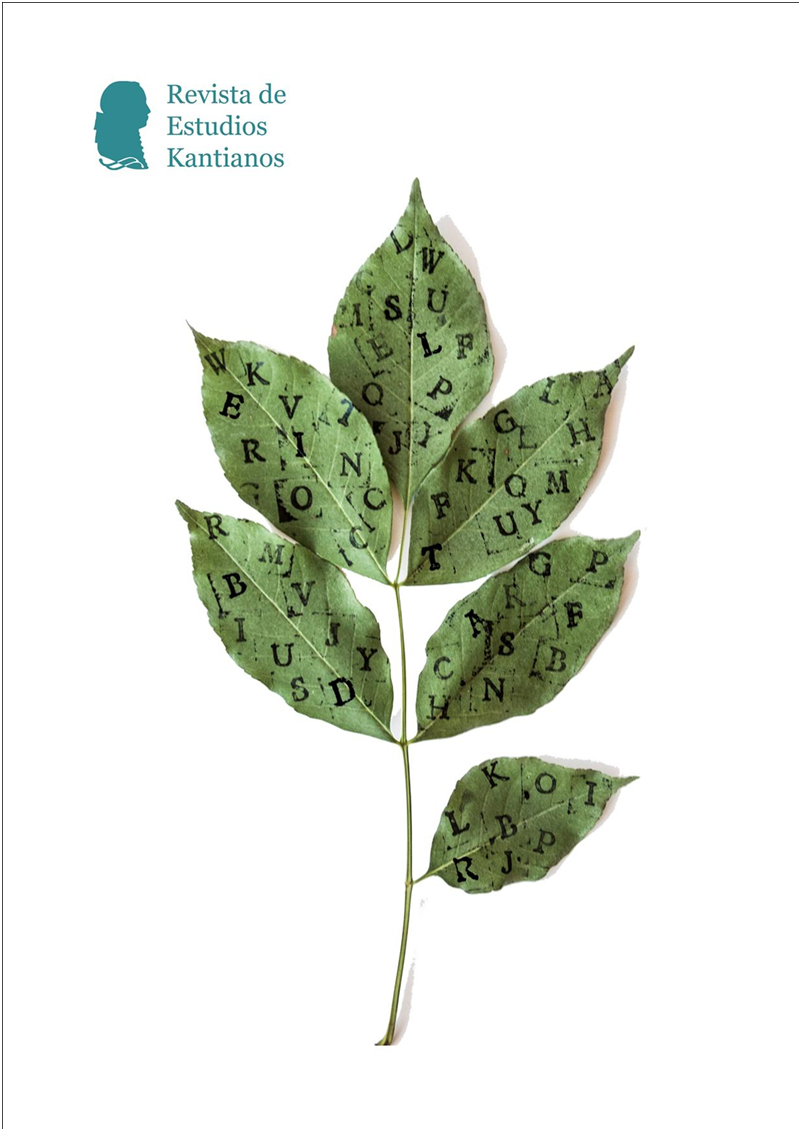El significado objetivo de la categoría de necesidad en el criticismo de Kant
DOI:
https://doi.org/10.7203/REK.9.1.28268Keywords:
Kant, causalidad, necesidad, significado objetivo, síntesis subjetiva. Abstract
Abstract
El propósito de este trabajo es delimitar el significado objetivo de la categoría de necesidad respecto de la significación objetiva del concepto puro de causalidad. Esta cuestión presenta cierta oscuridad, dado que parece haber un solapamiento entre los significados objetivos de ambas categorías, los cuales se desprenden respectivamente de la “Segunda Analogía de la experiencia” y del “Tercer postulado del pensar empírico en general” de la KrV. La estrategia argumentativa a emplear consiste en subrayar que en el caso de la categoría de causalidad nos hallamos frente a una síntesis de estados objetivos, mientras que en el caso de la categoría de necesidad se efectúa lo que Kant denomina síntesis subjetiva, la cual tiene lugar entre un objeto ya constituido y la razón teórica en su uso empírico.
 Downloads
Downloads
 References
References
Arias-Albisu, M. (2011). La concepción objetiva de la sustancia en la Crítica de la razón pura de Kant. Estudios de Filosofía, 44, 39-60.
Butts, Robert (1969). Kant’s Schemata as Semantical Rules. En L. W. Beck (ed.), Kant Studies Today (pp. 290-200). Open Court.
Feldman, Susan (1989). Kant’s Schemata as Reference Rules. En G. Funke y Th. Seebohm (eds.), Proceedings of the Sixth International Kant Congress (pp. 229-240). Centre for Advanced Research in Phenomenology, University Press of America.
Gasperoni, Lidia (2016). Versinnlichung. Kants transzendentaler Schematismus und seine Revision in der Nachfolge. De Gruyter. doi: https://doi.org/10.1515/9783110476170
Hahmann, A. (2009). Kritische Metaphysik der Substanz: Kant im Widerspruch zu Leibniz. Walter de Gruyter.
Hogrebe, W. (1974). Kant und das Problem einer transzendentalen Semantik. K. Alber.
Hutton, J. (2021). Kant, causation and Laws of Nature. Studies in History and Philosophy of Science, 86, 93-102.
Jáuregui, C. (2021). Sobre la posibilidad de una interpretación monista de la Primera Analogía de la Experiencia. Revista latinoamericana de filosofía, vol.47, n.1, 1-10. http://dx.doi.org/10.36446/rlf2021173
Kannisto, T. (2017) Kant on the Necessity of Causal Relations. Kant-Studien, 108 (Issue 4), 495-516. https://doi.org/10.1515/kant-2017-0041
Kant, I. (1900). Gesammelte Schriften. Walter de Gruyter.
Kant, I. (2022). Crítica de la razón pura. Traducción introducción y notas a cargo de Mario Caimi. Colihue.
Leserre, D. (2018). La filosofía del lenguaje en Kant. Teseo.
Loparic, Z. (2000). A semântica transcendental de Kant. UNICAMP.
Lütterfelds, W. (2003). Kant in der gegenwärtigen Sprachphilosophie. En D. Heidemann y K. Engelhard (Eds.), Warum Kant heute? (pp. 150-176). Walter de Gruyter.
Markis, D. (1982). Das Problem der Sprache bei Kant. En B. Scheer y G. Wohlfart (Eds.), Dimensionen der Sprache in der Philosophie des Deutschen Idealismus (pp. 110-151). Königshausen & Neumann.
Motta, Giuseppe (2012). Die Postulate des empirischen Denkens überhaupt. De Gruyter. doi: https://doi.org/10.1515/9783110287745
Nolan, John (1979). Kant on Meaning: Two Studies. Kant-Studien, 70, 113-130. https://doi.org/10.1515/kant.1979.70.1-4.113
Oroño, M. (2021). El significado sensible de la categoría kantiana de posibilidad. Disputatio. Philosophical Research Bulletin, 10, 139–163.
Oroño, M. (2022). Kant and the Objective, Logical and Transcendental Meaning of the Categories. Estudos Kantianos, 10, 185–198.
Pérez, Daniel (2008). Kant e o problema da significação. Champagnat.
Sanz, G. (2005). Wie viel Substanz braucht Kant. Revista Portuguesa de Filosofia, 61 (3-4), 707-730.
Schönrich, G. (1981). Kategorien und transzendentale Argumentation. Kant und die Idee einer transzendentalen Semiotik. Suhrkamp.
SIMON, J. (1974). Phenomena and noumena: on the use and meaning of the categories. En Beck, L. W. (Ed.), Kant’s Theory of Knowledge (pp. 45-51). D. Reidel Publishing Company.
—------------------- Immanuel Kant. En T. Borsche (Ed.), Klassiker der Sprachphilosophie (pp. 233-256). C. H. Beck.
Thöle, B. (1998). Die Analogien der Erfahrung. En G. Mohr y M. Willaschek (eds.), Kritik der reinen Vernunft (pp. 267-296). Akademie Verlag.
Westphal, K. (2004). Kant’s Transcendental Proof of Realism. Cambridge University Press.
Downloads
Published
How to Cite
-
Abstract129
-
PDF (Español)35
Issue
Section
License
![]()
The authors who publish in this journal agree with the following terms:
- The authors retain their copyright and guarantee to the journal the right to be the first to publish the work and to license it under a Creative Commons Attribution License that allows others to share the work with an acknowledgement of its authorship and the initial publication in this journal.
- Authors may separately establish additional agreements for non-exclusive distribution of the version of the work published in the journal (for example, placing it in an institutional repository or publishing it in a book), with acknowledgement of its initial publication in this journal.
- Authors are allowed and encouraged to disseminate their work electronically (e.g., in institutional repositories or on their own website) before and during the submission process, as this can lead to productive exchanges as well as earlier and greater citation of published work (see The Effect of Open Access).








